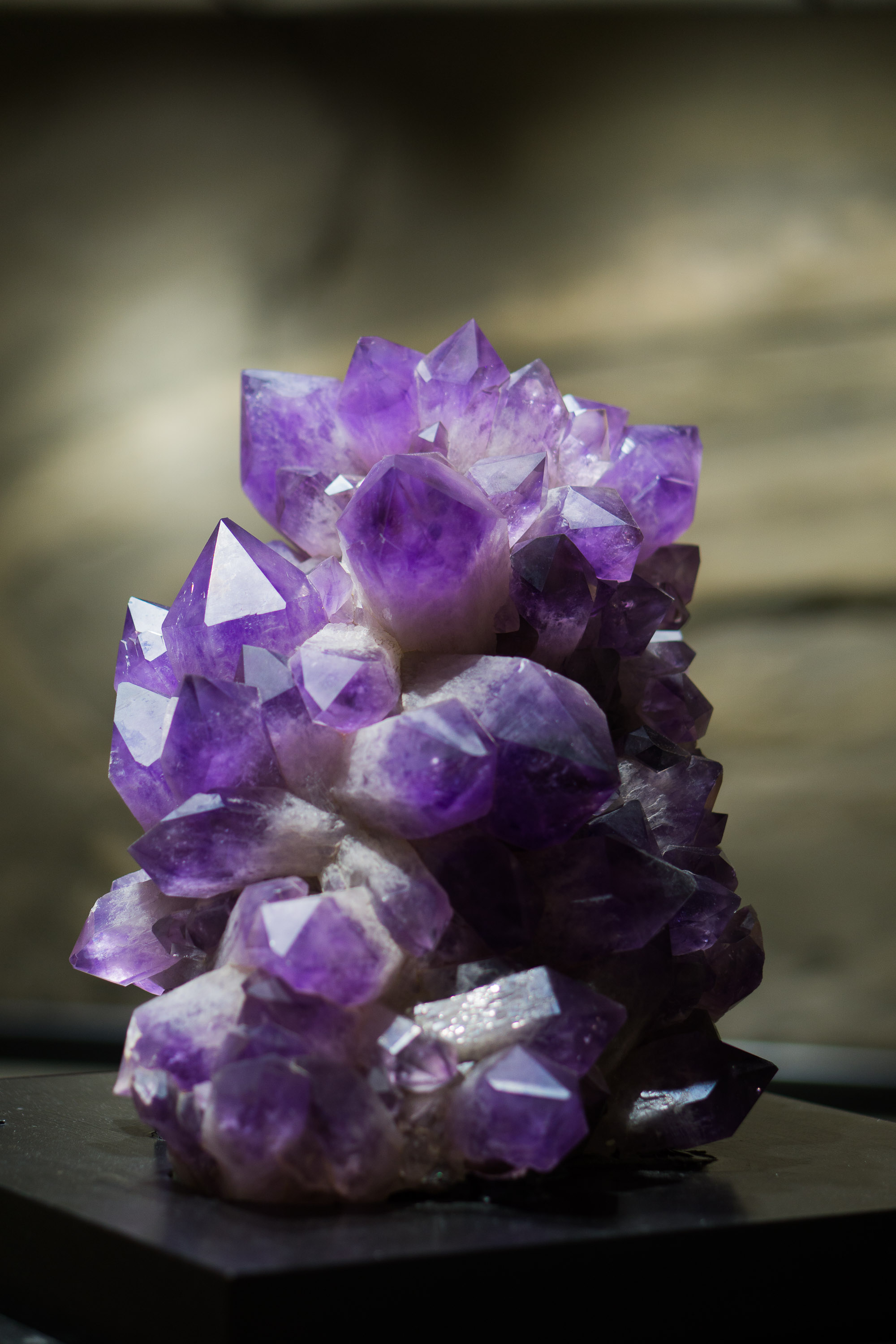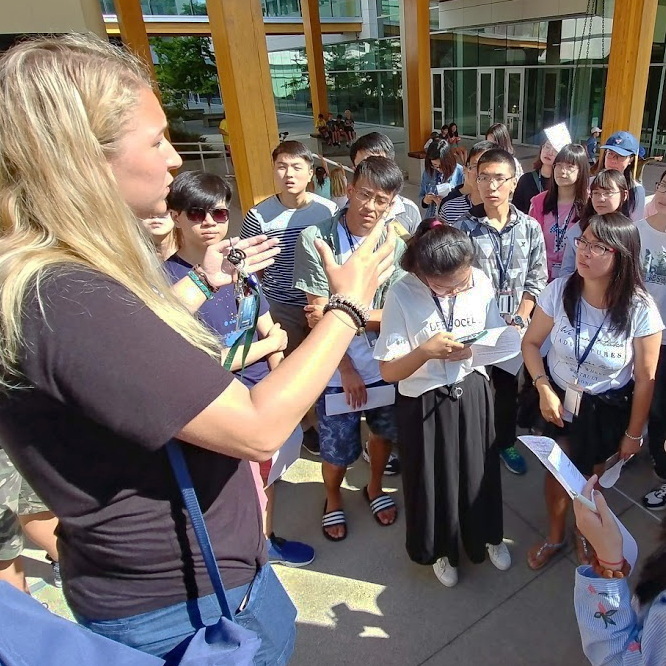About
UBC’s Vancouver International Summer Program is a four-week academic program providing visiting undergraduate students with opportunities to experience our world-class science education while exploring Vancouver's beautiful landmarks and culture at the same time.
Our two program packages each consists of two courses totaling approximately 80 hours of class time. Courses are directed and taught by UBC faculty members and graduate students. Interactive classes will include group discussions, guest lecturers, research projects, laboratory experimentation, short field trips and other engaging learning opportunities. Course credit will be granted at the discretion of the participating universities.

Package A - Earth's Treasures and Perils: Minerals and Natural Disasters
This package is designed to examine the origin and formation of our planet and its economic resources. From its early beginnings our planet has evolved dramatically, with an ever changing surface subject to vast plate movements and billions of years of weathering and erosion. Students will discover how volcanoes, earthquakes, and other natural disasters affect lives, economies and environments. Both courses emphasize experiential learning where concepts are discovered through active learning in the classroom, innovative laboratory experiments and field trips, such as UBC's world famous Wreck Beach and the popular Britannia Mining Museum in Squamish.
Disaster Resilience: Learning from Natural Hazards
Earth experiences a wide variety of natural disasters; earthquakes, volcanoes, landslides, Tsunami, hurricanes, storms, floods and Forest Fires. As the global human population increases, with a growing reliance on built infrastructure, it is critical that we understand and mitigate the potential impacts of these natural disasters on our lives, economies and communities. This is particularly true in the face of on-going climate change, which is increasing the frequency and intensity of some of these natural hazards. In this course, you will learn how natural disasters are created, when and where they occur, and how you can protect yourself, your loved ones, and your communities. Taking advantage of UBC’s location in Vancouver, the course will include field trips to a range of environments – from the coast to the mountains – which can experience different types of natural hazards.

Earth’s Treasures: Exploring Precious Gems and Minerals
Canada is also known for its spectacular precious minerals and gems, many of them on display in UBC’s Pacific Museum of Earth. Besides their natural beauty, many of these minerals, including copper, cobalt, lithium and others, are also critical for the green energy transition. This course investigates the formation, exploration, extraction and distribution of gemstones, precious metals, and critical minerals. Using a wide range of real samples from across North America, you will learn to identify a variety of mineral and gem specimens, look at fine jewelry, and also learn how gems and metals are formed geologically, and how they are discovered, mined and sold on the commercial market. This class will emphasize active learning methods, where students have opportunities to explore the subject matter through field trips, hands-on labs, discussions and in-class activities.
Our emphasis is on active learning teaching methods where students are inspired to explore the subject matter through field trips, labs, discussions and in class activities.
No background knowledge of geology is required for package A.
Package B - Blue Planet: Earth's Ocean, Atmosphere, Climate, and Marine Biodiversity
In this package we explore the dominant processes that control the atmosphere and the oceans, and investigate the diversity of life found in marine ecosystems. Students will discover how energy flows through these systems and how the energy flow controls winds and ocean currents. We will discover how the winds and currents influence the climate and movement of pollution, and the effect these fluid movements have on the ocean biosphere and make up of marine ecosystems. Both courses emphasize experiential learning where concepts are discovered through active learning in the classroom, innovative laboratory experiments and field trips to collect and interpret observations in the diverse ocean and atmospheric environments near Vancouver. Escape the classroom and discover with us!

From Sea to Sky: Understanding Ocean, Atmosphere, and Climate systems
A basic knowledge of Earth’s climate system is critical to understanding the future trajectory of global climate change, and designing appropriate mitigation and adaptation strategies. In this course, you will assess and quantify the principal components of the Earth's climate system, exploring the global energy balance and its impact across the planet. You will learn about the structure of the ocean and atmosphere, how winds and currents control weather and air pollution, and how the climate system interacts with the terrestrial and aquatic biosphere. You will also examine how ocean and atmospheric processes regulate geochemical cycles and climate over geologic time.
Seas of Life: Discovering Marine Biodiversity
Students in this course will explore the incredible diversity of marine ecosystems, and identify the factors that regulate a wide range of ocean habitats, including deep sea hydrothermal vents, intertidal zones, coral reefs, estuaries, open oceans and polar ecosystems. Topics of study will include the ecological properties of marine waters, including productivity, biodiversity, and resilience to environmental change, invasive species and pollution. Particular emphasis will be placed on the beautiful and diverse local marine ecosystems around Vancouver, using active learning methods where students explore the subject matter through field trips, hands-on labs, discussions and in-class activities.
Our emphasis is on active learning teaching methods where students are inspired to explore the subject matter through field trips, labs, discussions and in class activities.
No background knowledge of oceanography is required for package B.

Classes are held 4-5 days a week with one day or one afternoon a week free. A typical schedule is as follows:
9:00–12:00 morning class
12:00–13:30 lunch break
13:30–16:30 afternoon class
The program includes a welcome celebration, a city tour, an orientation to the UBC campus and the Earth Ocean and Atmospheric Sciences Department, a farewell ceremony and meal, and some evening activities (such as a movie night or a sports night). Optional activities such as sporting events, museum visits, and sightseeing day-trips will be offered for a fee.
Participants will be housed in one of three UBC residences on campus with easy access to classes, libraries, sport facilities, and transportation: Ritsumeikan-UBC House, Totem Residence, or Walter Gage Towers. Students will stay in shared suites that include 4-6 single bedrooms, an in-suite bathroom with a shower and toilet, a lounge area with a television, and a fully-equipped kitchenette. High-speed wired internet is included. The residences are secure and have a 24-hour front reception desk. Groups are supported by Faculty of Education staff. If maximum occupancy is reached in apartment style accommodation, students may be placed in dormitory style accommodation.
Applications for VSP 2024 is now open!
Please ensure you have read and reviewed our application requirements, step-by-step application guide and fees information before accessing the application form. Our application form is best supported on Google Chrome or Mozilla Firefox on a laptop or desktop computer.
Eligibility
Participants must be undergraduate students (typically in their first 2 years of study) at international institutions who are proficient in English (all classes will be taught in English) and have a strong academic background.
Course packages have a minimum and maximum class size, so institutions are encouraged to register their students as early as possible. Course packages that do not meet the minimum number of students will not be offered. Students will be informed if their first choice package is full or has been canceled and will be given the option to choose another package.
Dates & Deadlines
|
Course Dates: July 12 - August 12, 2024 |
|
|
Participant Registration Deadline: April 5, 2024 |
|
|
Arrive in Vancouver: TBA |
|
|
Classes:TBA |
|
|
Depart Vancouver: TBA |
Program Fee & Application
The 2024 package fee is $5,825.00 (Canadian Dollars) per student. This amount included:
- Tuition
- Course materials
- Accommodation (31 nights)
- Medical insurance
- Airport transfer (for group arrival/departure)
- City tour
- Orientation and farewell events
- Some social activities (optional trips may require an additional fee)
Please see: Fees and Expenses – Vancouver Summer Program (ubc.ca) for more details
Students need to meet their institution's requirements for studying abroad and must be proficient in English and have a strong academic background. Participating universities should notify UBC of their interest in the program well in advance so that accommodation and instructors can be booked. Please see Science – Earth, Ocean, and Atmospheric Sciences – Vancouver Summer Program (ubc.ca) for more details.
|
Asia |
South Asia & the Middle East |
Vancouver/All other Inquiries |
Vancouver |
|
Vancouver Summer Program Central Office
|
Mr. Stephen Kumar |
Vancouver Summer Program Central Office
|
Ian Ayeras |







